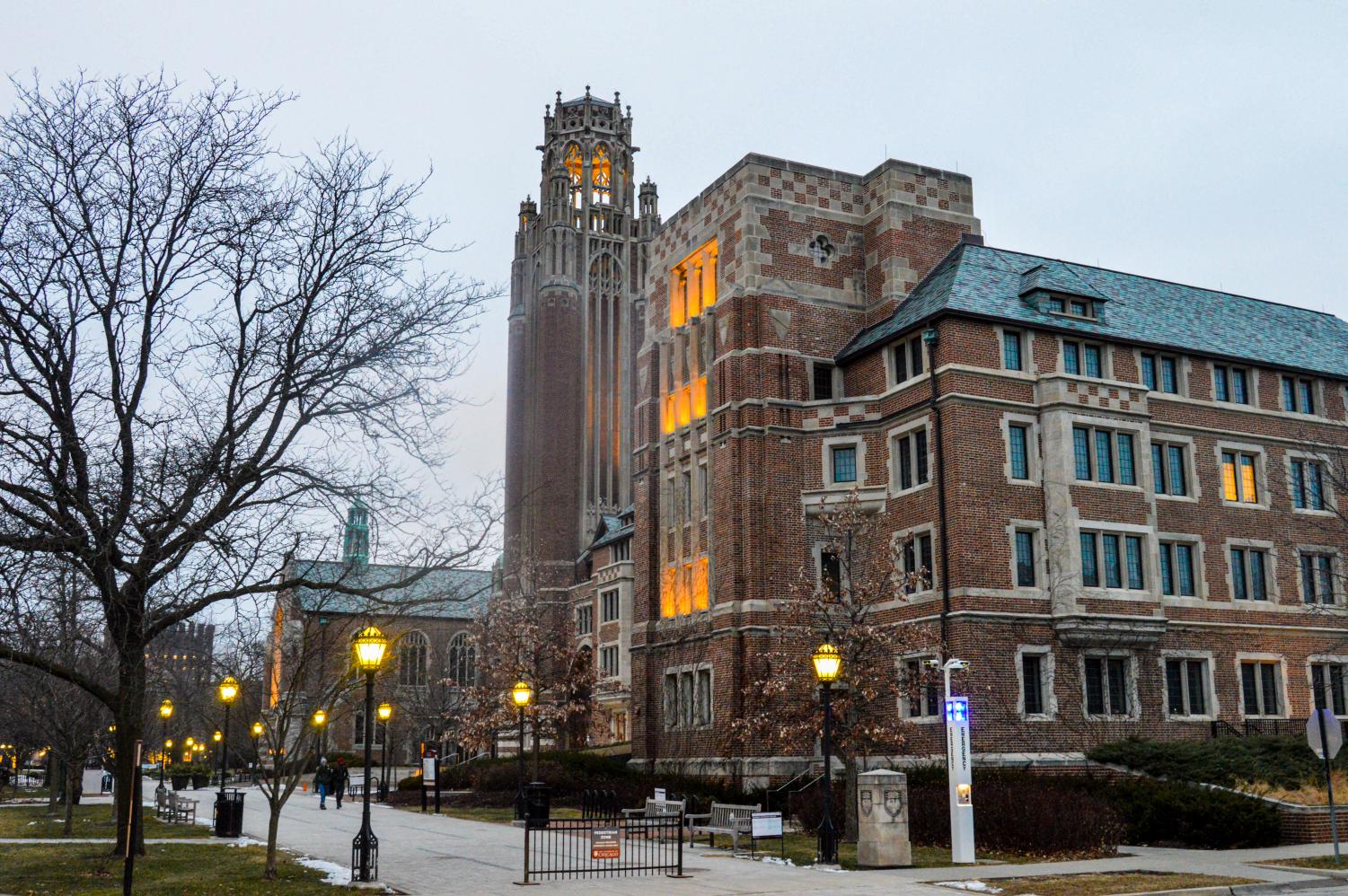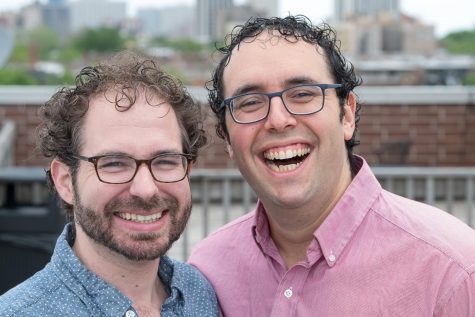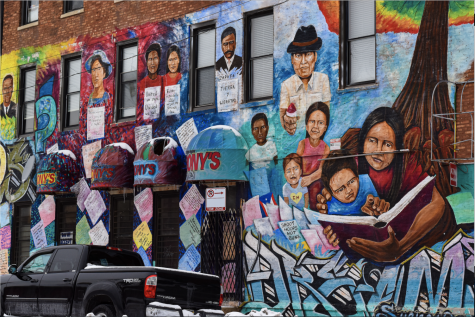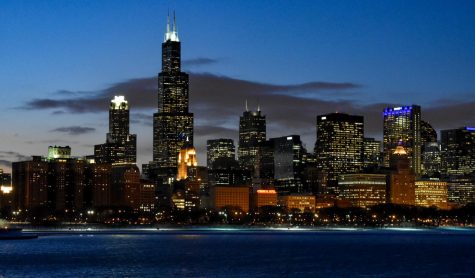Community organizations demand reparations from University of Chicago
Since 1901, a bronze plaque hung in Hutchinson Commons on the University of Chicago campus, which honored the contributions of Stephen Douglas, an Illinois politician and lawyer. Last summer, the university removed the plaque in an attempt to condemn Douglas’ historical ties to slavery.
While the university has taken the first steps to address prior connections to Douglas, some community organizations believe that this act of symbolism is not enough, arguing that recognition of the institution’s past must go a lot further.
Community organizations on the South Side argue that the connection between the university, slavery and harm done to the people on the South Side run a lot deeper than the university currently acknowledges. In response to the university’s history, organizations demand collaboration with the university for reparations that will meet community needs.
Founded in 2017, the Reparations at University of Chicago Working Group, or RAUC, published a paper in 2018 exploring the ties between Sen. Douglas, the Old University of Chicago, and the current University of Chicago founded in 1890.
In the article, the RAUC explains that Stephen Douglas, a congressman and later a Senator from Illinois, in 1847 married into a Southern family that enslaved Black people in Mississippi. He amassed a huge profit from this exploitation, began buying real estate in Illinois and purchased land in what is now Bronzeville. In 1855, he donated this land to the new institution of University of Chicago. Though gaining land allowed the university to build legitimacy and connect with more donors, ties to Douglas ultimately damaged the university’s reputation. The board decided to rename the university to “The Old University of Chicago,” which eventually fell into debt and declared bankruptcy in 1866. In 1890, the current University of Chicago as it is known today was founded, without any official legal ties to Douglas.
Even with these changes, the RAUC argues in their paper that “the University of Chicago owes its entire existence to slavery.”
President Robert Zimmer disputed this connection over the summer after the RAUC argument that the old and new universities were linked. Mr. Zimmer said that Douglas died in 1861, and had no ties with the current University of Chicago founded in 1890.
We begin to analyze the university’s own practices after slavery. You know — with racial restrictive covenance, with gentrification, with UCPD — all of these abuses that have kind of subjugated that community, the South Side.
— David Johnson
Though it was a new institution by name and by law, half of the new university’s board members had direct ties to the Old University. Additionally, it had many of the same donors, faculty and resources as the Old University, and they were essential in building the university’s prestigious legacy.
David Johnson, a first-year master’s student at the Harris School of Public Policy, works as organization liaison for the RAUC. Mr. Johnson believes that even though the University of Chicago is not the only university in the country to owe reparations, it is in a unique place to mend the harms it has caused.
“We begin to analyze the university’s own practices after slavery. You know — with racial restrictive covenance, with gentrification, with UCPD — all of these abuses that have kind of subjugated that community, the South Side,” Mr. Johnson said. “It really has the potential and the grounds to do something that’s never been done before, but is still owed.”
U-High history teacher Paul Horton believes that although the university has no legal obligation to pay reparations, it has a moral and ethical obligation, especially if money from the Doulgas estate had been donated to the university founded in 1890. He also noted that it was possible that donations to the university may have come from Southern families who enslaved people.
“If we find that there are major benefactors of the University of Chicago who come from Southern families who owned slaves, who profited from slavery, then we should pay reparations,” Mr. Horton said. “Some more research needs to be done about that beyond Stephen Douglas.”
According to Mr. Johnson, reparations could come in many forms. They would likely be direct reparations to the descendants of those enslaved by Douglas, or investments into the South Side community focused on education, housing and healthcare. The most important aspect is that reparations are organized not just by the university, but by the community.
“It kind of looks like charity because they’re deciding what they want to do, if they want to do it, how much they want to give, but that defeats the purpose of what the repair is supposed to be,” Mr. Johnson said. “It will always fail if the victims or the survivors are not at the forefront of this conversation.”
The removal of the Douglas plaque last summer was an example of what happens if the university does not consult any organizations. According to Mr. Johnson, there was no communication from the university regarding the plaque and that no community group had asked for it to be pulled down.
“Of course, it’s a good step in the right direction,” Mr. Johnson said. “But if you are just gonna do things without putting these different organizations at the table, then you continue to have that chasm between those different groups and between the university, and you really never unify because you’re not doing it with cohesion.”
Mr. Horton believes the university community needs a deeper reconciliation with its past of gentrifying Hyde Park.
“We need to talk about these things, we need to have serious talks about it, and the university needs to encourage these talks,” Mr. Horton said. “We need to get beyond lip service with diversity and we need to get beyond symbolism. The university needs to go much farther than it has.”
The conversation about reparations from universities has been happening nationally for a few years. Schools such as Georgetown University, University of Virginia and Brown University have taken steps toward reparations, yet Mr. Johnson said the University of Chicago has not recognized the efforts of the RAUC or other organizations.
“It really doesn’t make sense that they would not acknowledge our presence, not acknowledge our efforts,” Mr. Johnson said. “Because, at the end of the day, it makes the university stronger when it recognizes this past harm and strengthens its own institutions by repairing those harms.”
Evanston City Council implements reparations program
Although reparative efforts for the Black community have been discussed in Evanston and cities across the United States for decades, Evanston is now leading the charge in putting discussion into action. If everything goes according to plan, Black residents of Evanston could have $25,000 to pay for housing and other home-related programs.
As an effort to address the effects of racial inequality, slavery and the war on drugs have had on Black residents, the Evanston City Council is instituting multiple reparations programs funded by a tax on marijuana established in 2019.
In a reparations town hall meeting Aug. 28, 2020, Robin Rue Simmons, alderman of Evanston’s fifth ward and chair of Evanston’s reparations committee, said the current plan for allocations of reparations is through housing benefits. According to Ms. Simmons, Black residents of Evanston will be eligible for up to $25,000 in grants to assist with homeownership, mortgage payments and home improvement funds. The tax can accumulate up to $10 million of funding for reparations allocation. A survey to gauge and prioritize interest in the program closes March 3.
According to a subcommittee member Kamm Howard, the committee is also considering alternative forms of reparations moving forward.
Mr. Howard defines reparations as, “any initiative specifically formed to address enslavement, Jim Crow or post-Jim Crow harms to the Black community.”
You can plan in year one to do things in year three, year four, year five, based on this model, based on having this in front of you and based on whatever resources you think are going to come down the pipeline.
— Kamm Howard
As summarized in a report by Mr. Howard, Evanston community members expressed interest in reparations funds applied to other areas such as direct cash, grants for businesses, a STEM center for the local school, co-ops such as kitchens and workspaces, access to education opportunities, public access to TV, genetic testing for exploration of birthright and connections to Africa, and funding for an art center.
“We know that you cannot do all of these things in year one,” Mr. Howard said in the town hall meeting, “but you can plan in year one to do things in year three, year four, year five, based on this model, based on having this in front of you and based on whatever resources you think are going to come down the pipeline.”
In the town hall meeting, Mr. Howard said for reparations to best serve the community they must meet three key guidelines. They must be determined and approved by the injured party, and address the past harms described in his definition.
Using this process, Mr. Howard said, “allows for those who are engaged in the process, the legislators, the stakeholders, the community, to prioritize reparative initiatives. It allows for you to focus intensely on the outcomes, whether it’s going to be satisfying, whether it’s going to be, where it’s going to be restitution.”
While many cities such as Asheville, North Carolina, and Providence, Rhode Island, began their reparations programs as a result of the George Floyd and Black Lives Matter Protests of the summer, Evanston City Council has been working on its current reparations program since June 2019 when marijuana was legalized in Illinois effective Jan. 1, 2020. In November 2020, the reparations subcommittee got approval for the tax on marijuana.





Vilasini S karnik MD • Mar 4, 2021 at 9:10 am
This is how I feel , in our country African American communities have been suppressed for generations and generations and now looking at Washington what is happening there is so horrible that , they are is not going to help , I feel all corporations and universities have moral obligations that they should to put some percentage of their profits into these communities to uplift them by building good schools and housing and small businesses health care clinics in these areas . You go visit these campuses so pretty but surrounding are many times are so neglected why ? If this is not change then I feel for new generations what they will have to go through . We do need to change , but not putting too much time on discussing and research on past , everybody knows what happened just change going forward. This is my opinion
Ben Sachs • Mar 3, 2021 at 6:21 pm
This was a really informative, interesting, and unique story. I really appreciate you all doing thorough research and presenting the arguments in an engaging way by interviewing members of our community as well as those who are working on reparations on a policy-implementation level. I also enjoyed having perspectives from both the south side of Chicagoland and the north!